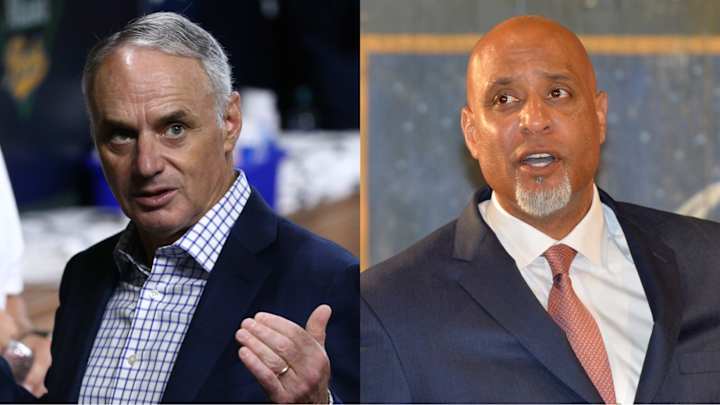MLB's Free Agent Frenzy Could Be Trumped When Lockout Ends

In the days leading up to the lockout on Dec. 2, Major League Baseball (MLB) saw a free agent frenzy unlike anything witnessed before. On the final day before the lockout began, teams committed a record of $1.4 billion in new contracts. The Texas Rangers accounted for about 40 percent of that amount, spending $561.2 million in their signings of Corey Seager, Marcus Semien, Jon Gray and Kole Calhoun.
Believe it or not, we could see something even more hectic when this lockout ends.
Baseball's ninth work stoppage isn't expected to end quickly, though we have not yet reached a point where the loss of games is a legitimate concern. According to a recent story by the Associated Press, "progress on a [Collective Bargaining Agreement] isn’t expected until at least the weeks before pitchers and catchers are set to report".
As we've stated here on InsideTheRangers.com several times, Feb. 1 is a good barometer for when MLB and the Players Association (MLBPA) could strike a deal. It may not happen until the weeks after, but ultimately, neither side wants to lose money. That's why most in the industry still expect there to be a full 162-game season.
READ MORE: MLB Implements Lockout; What It Means and When It Might End
Whenever the two sides finally come to an agreement, there are a number of issues to tackle, with spring training topping the list of concerns. If spring training is shortened, that means less ticket revenue, and neither side is about losing money. However, spring training isn't the only issue. The business that would normally take place during the offseason has to be settled prior to the start of the regular season.
Currently, there are 141 big-league free agents waiting for a chance to negotiate new contracts since all Major League business is frozen until the lockout ends. That also means clubs cannot court free agents during the work stoppage. If a deal is in place by Feb. 1, that gives teams and free agents about two weeks to get their business done before pitchers and catchers are supposed to report to their respective camps.
There are still several big names left on the market. Carlos Correa, Freddie Freeman, Trevor Story, Nick Castellanos and Kris Bryant headline the remaining position players while starting pitchers like Carlos Rodón and Clayton Kershaw are still available. In addition, players like Justin Verlander, Jordan Lyles and Nick Martinez all agreed to contracts, but were not made official prior to the start of the lockout. So their agreements are currently in limbo.
On top of free-agent business, teams must have time to negotiate contracts with their arbitration-eligible players. The original deadline for clubs and arbitration-eligible players to file salary figures was set for Jan. 14, and most clubs agree to contracts with this crop of players by this deadline. However, clubs cannot speak to players on the 40-man roster (or their representation) during the lockout. There will need to be time allotted for this group to negotiate their salaries, and have an arbitration hearing if needed.
Of course, salary arbitration is a key economic issue in CBA negotiations. One proposal from the MLBPA included players being able to file for arbitration after two years of MLB service instead of three. On the other end of the spectrum, one proposal from MLB completely threw out the arbitration system in favor of one that pays players based on FanGraph's calculation of Wins Above Replacement. In other words, the arbitration system could look very different under the new CBA.
The major league portion of the Rule 5 draft, which has been postponed indefinitely, needs to be figured out as well. The minor league phase went on as scheduled at last week's Winter Meetings in Orlando since all business regarding Minor League Baseball (MiLB) is not affected by the lockout. However, the major league portion will not take place as long as there is a lockout, which means this will be the first year the draft will not take place since 1920.
Just like free agency and business with arbitration-eligible players, the earlier a new CBA is in place, the better it is for the Rule 5 draft. If MLB and the MLBPA take into the latter stages of February or early March to sign a new CBA, it could potentially threaten the major league phase of the Rule 5 draft altogether.
We can look back fondly of the several days prior to the lockout, and how baseball was the talk of the sports world even while the NFL, NBA, NHL and college football are all going strong. It's even given some the idea that MLB should adopt some sort of deadline for free-agent signings to spark more interest in future offseasons.
Yet, all of that may pale in comparison to what happens in the coming months.
Make sure to like SI's 'Inside The Rangers' on Facebook
